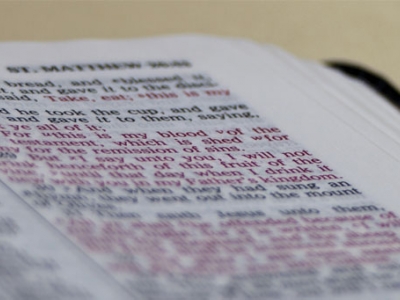
Passing on the faith through catechesis
Mark Earngey explains the history of catechesis and its relevance for today.
*This is an edited version of a talk presented at the Centre for Christian Living ‘Raising the next generation’ event held on 20 October 2021.*
Passing on the faith in the biblical story
It’s clear from the Bible that God has always wanted children to know and to love him. He created Adam and Eve so that humanity would increase and fill and subdue the earth. Of course, our first parents’ faithlessness and fall into sin threw a really significant spanner into the works. But that is what makes their descendant Abraham’s faith and rise into grace just so marvellous. The covenant that God makes with Abraham has countless children in mind. But for this to happen, Abraham is required to pass on the faith to his children:
For I have chosen him, so that he will direct his children and his household after him to keep the way of the Lord by doing what is right and just, so that the Lord will bring about for Abraham what he has promised him. (Genesis 18:19)
It’s little wonder that when we come to Moses, we see the same thing in even greater detail. He instructs the Israelites:
Hear, O Israel: The Lord our God, the Lord is one. Love the Lord your God with all your heart and with all your soul and with all your strength. These commandments that I give you today are to be on your hearts. Impress them on your children. Talk about them when you sit at home and when you walk along the road, when you lie down and when you get up. Tie them as symbols on your hands and bind them on your foreheads. Write them on the doorframes of your houses and on your gates. (Deuteronomy 6:4–9)
I think that sort of teaching is probably in the background of Solomon’s Proverbs, when he urges children to listen to their parents’ teaching and instruction because ‘They are a garland to grace your head and a chain to adorn your neck’ (Proverbs 1:9).
Hundreds of years later, when Jesus Christ comes into the world, we see a similar stance when it comes to passing the faith onto children. In Matthew 19 we see Jesus praying for children, caring for children, declaring that the kingdom of heaven is also theirs.
And after Jesus’ mighty sin-bearing death and earth-shattering resurrection, he declares in the Great Commission that his disciples, both adults and children, need to be baptised and taught to obey all his teachings (Matthew 28:19–20). And we can see the faith being passed on to Jesus’ followers, both young and old. As the Apostle Paul wrote: ‘Fathers, do not exasperate your children; instead, bring them up in the training and instruction of the Lord’ (Ephesians 6:4).
Paul also knows the important place of motherhood for passing on the faith. He speaks about the transmission of faith in Timothy’s own life story: from his mum Eunice and his grandma Lois (2 Timothy 1:5).
From this whistle-stop tour of the Bible we can see that the passing on of the faith to the next generation really does matter to God. One of the key words used to describe this is catechising. It comes straight from one of the Greek words of the New Testament and means ‘teaching’ or ‘instruction’. And this is something that Christians have kept on doing in the church and in the home ever since New Testament times.
Passing on the faith in the historical story
In the early Church
In the early Church, catechesis was the moral and doctrinal instruction given to new converts who rejected their pagan past and embraced the Lord Jesus Christ. For instance, we know from Hippolytus who wrote in the third century that a catechumen (someone being catechised or taught) was taught the basics of Christianity for three years before they could belong to the Church properly. And we know from Cyril’s Pro Catechesis in the fourth century that lots of doctrine was taught and examined, like the virgin birth, the cross of Christ, the resurrection, the ascension and so forth.
After the Church exploded geographically it started to explode organically, largely as a function of children being born to Christian families. And so in the following centuries catechesis was an important form of teaching both in the church and in the home.
During the Reformation
By the time of the Reformation, catechesis regularly took the form of a series of questions and answers about the Christian faith. The questions were short and memorable—easy to teach and easy to learn. For example:
Q. What does ‘You shall have no other gods before me’ mean?
A. That we should fear, love and trust in God above all things.
The great German friar Martin Luther wrote catechisms, and he expected churches and families to use them. He recommended: ‘Let all Christians drill themselves in the catechism daily, and constantly put it into practice’ (Large Catechism, 1529).
The great English reformer Thomas Cranmer actually produced a very important catechism himself. The preface to his catechism sets out the biblical warrant for catechesis:
And truly it is no new thing that the children of godly parents should be instructed in the faith and commandments of God, even from their infancy. For does not God command his people to teach his law to their children, and their children’s children? … Does it not appear by plainly expressed words of Paul, that Timothy was brought up even from a child in the Holy Scriptures? Have not the commandments of Almighty God, the Articles of the Christian faith, and the Lord’s Prayer, been necessarily always (since Christ’s time) required of all, both young and old, that professed Christ’s name? (Catechismus, 1548)
The great French reformer Jean Calvin believed that without catechesis, the Church would die out:
If you desire to build an edifice which shall be of long duration, and which shall not soon fall into decay, make provision for the children being instructed in a good Catechism, which may shew them briefly, and in language level to their tender age, wherein true Christianity consists. (Letter to Somerset, 1549)
Principles from the past for the present
Three ‘biggies’
Historically, there were often three big features of Christian catechising—the Apostles’ Creed, the Lord’s Prayer, and the Ten Commandments. The historic catechisms tend to use those three ‘biggies’ as a kind of superstructure to explore other points of biblical doctrine. A catechism might start with the phrase ‘I believe in God the Father Almighty’ and it might ask ‘Who is God? How many persons are there in God? What are their names?’
Repetition and pointing
Historically, there are two major techniques used in Christian catechesis: repetition and pointing. Repetition is such an important way of drilling ideas and concepts into our heads and hearts. It’s gone out of fashion—at our peril!
Pointing is basically asking pointed questions. For example:
Q: ‘Who made you?’ A: ‘God’
Q: ‘What else did God make?’ A: ‘Everything’
Q: ‘Why did God make you and everything?’ A: ‘For his glory’
One single habit
Catechising shouldn’t be a clunky, awkward, occasional thing, but something which is naturally woven into the fabric of church and home life. To paraphrase Deuteronomy: when you sit down at home for dinner, when you walk along the road on the way to drop the kids off at school, and just before you lie the kids down at night.
Give it a go!
Catechesis is part of the story of God’s people in the Bible, and part of the story of God’s people in history. So, give it a go! I’ve loved doing catechisms with my kids and I reckon you would too!
Here are a few modern catechisms that I can recommend:
- First Catechism (Great Commission Publications)
- Songs for Saplings: Questions with Answers (Music available to stream online)
- New City Catechism (Crossway)
- The Acrostic of God (New Growth Press)
- Catechismo Kids (Colin Buchanan)
---
Rev Dr Mark Earngey is Head of Church History at Moore Theological College, Sydney and the author of Reformation Worship: Liturgies from the Past for the Present (New Growth Press, 2018). He is married to Tanya and they have four children.

A Sneaking Suspicion
John Dickson's engaging evangelistic book for young people discusses things that matter—things like life, death, relationships, sex, suffering, meaning and God—things that are important but which we don't often talk about.
For more articles from Growing Faith, subscribe to our monthly e-newsletter.
To hear about the latest books and resources from Youthworks Media, subscribe here.








